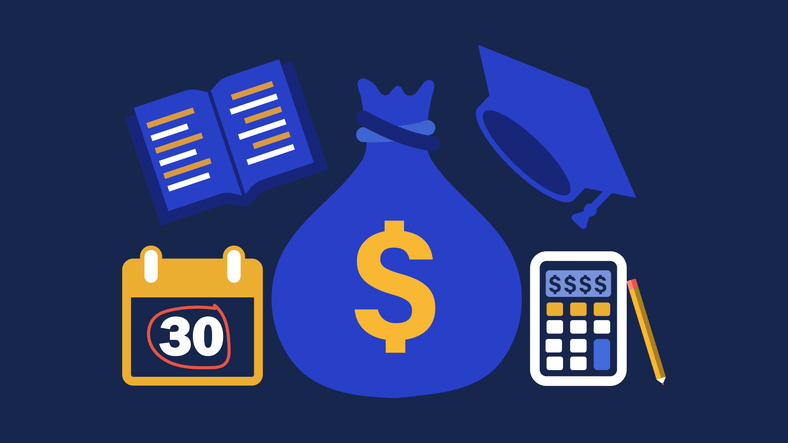Becoming a Certified Management Accountant (CMA) is a significant milestone in the careers of professionals in the accounting and finance fields. The CMA designation is a globally recognized certification that signifies a high level of expertise in financial management, strategic decision-making, and leadership. However, the road to earning the CMA involves several steps and a variety of costs. This comprehensive breakdown will help you understand the fees and expenses associated with the CMA exam, so you can make an informed decision about your investment in this certification.

Table of Contents
What is the CMA Exam?
The Certified Management Accountant (CMA) exam is a professional certification exam designed to assess a candidate’s expertise in financial management, accounting, and business decision-making. The exam is offered by the Institute of Management Accountants (IMA) and is one of the most prestigious certifications in the accounting and finance fields.
CMA Exam Content
The CMA exam focuses on the following key areas:
- Financial Planning, Performance, and Analytics: This section covers budgeting, forecasting, financial analysis, and performance management. It also includes cost management and decision analysis, which are vital for professionals involved in corporate finance.
- Strategic Financial Management: This section focuses on topics like risk management, corporate governance, investment decisions, and the strategic planning required to steer an organization’s financial direction.
To earn the CMA designation, you must pass both parts of the CMA exam, which are structured as follows:
- Part 1: Financial Planning, Performance, and Analytics.
- Part 2: Strategic Financial Management.
In addition to passing the CMA exam, candidates must also meet specific work experience requirements, usually two years in a professional role related to management accounting or financial management.
Why Take the CMA Exam?
The CMA certification is beneficial for professionals who aim to move into higher-level roles within their organization, especially in leadership positions. It provides individuals with:
- Credibility: The CMA is respected by employers around the world and demonstrates a high level of expertise.
- Career Advancement: With a CMA certification, you’ll be eligible for more senior roles, often in financial leadership, such as CFO, financial controller, or director of finance.
- Higher Earnings: Certified professionals often earn higher salaries than their non-certified counterparts.
While preparing for the CMA exam is an investment of time, energy, and money, the potential rewards in terms of career growth and earning potential make it a worthwhile pursuit for many professionals.
CMA Exam Fees and Expenses
While the cost of earning your CMA can vary depending on where you are in your career and your approach to CMA exam preparation, here’s a breakdown of the key costs you should expect.
Cost for Professionals vs. Students
The total cost of earning the CMA certification differs depending on whether you’re a professional or a student:
- For professionals, the total CMA exam cost is approximately $1,290.
- For students, the CMA exam cost is generally $965.
This total cost includes various components such as the CMA exam fees, IMA membership fees, CMA entrance fees, and any additional study materials or courses.
Let’s break down each of these costs more thoroughly.
CMA Exam Fee
The CMA exam fee is one of the most significant costs associated with the CMA certification. It is important to note that the CMA exam consists of two parts, and the cost is assessed per part:
- $495 for each part of the CMA exam.
- Total $990 for both parts.
This fee covers the cost of administering the CMA exam, including the development, delivery, and scoring. It is important to note that this fee is non-refundable, meaning if you choose to cancel or reschedule your CMA exam, the fee is not reimbursed. However, rescheduling is possible with a penalty fee, provided the request is made a certain number of days in advance of your CMA exam date.
Many candidates will choose to take both parts of the CMA exam in one testing window to streamline their certification process, though you have the flexibility to take the parts separately if needed.
Rescheduling Fees
- $50 for each rescheduling request, provided it’s within the timeframe allowed by the IMA.
IMA Membership Fee
The IMA (Institute of Management Accountants) membership is required for all CMA candidates. The IMA is the professional body that oversees the CMA exam, and membership provides access to a range of benefits including study resources, networking opportunities, and access to exclusive job boards.
The cost of IMA membership depends on the type of membership:
- Professional Membership: Ranges from $195 to $295 per year, depending on the level of membership.
- Student Membership: $45 per year for full-time students.
- A one-time processing fee of $15 applies to both Professional and Academic members.
Benefits of IMA Membership:
- Access to exclusive educational resources and online forums.
- Discounted fees for IMA-hosted events and conferences.
- Networking opportunities with over 140,000 accounting and finance professionals worldwide.
- Access to CMA study resources, including webinars, workshops, and guides.
While the IMA membership is an added cost, it’s essential for gaining access to these valuable resources. The IMA’s educational and networking tools can be invaluable for those looking to advance their careers.
Scholarships for Students
The IMA offers a CMA scholarship program for students pursuing their degree in accounting or finance. These scholarships can help offset the cost of the membership and provide access to valuable resources for CMA exam preparation.
CMA Entrance Fee
The CMA entrance fee is another significant cost, which is charged separately from the CMA exam fee. This fee ensures that the candidate has met the necessary qualifications before embarking on the certification process.
- $300 for professional members.
- $225 for student or academic members.
The entrance fee covers the verification of your educational qualifications and professional experience. It also provides support throughout the certification process, including a review of your qualifications before you can sit for the CMA exam.
This fee is non-refundable once paid, so ensure that you meet the requirements before submitting your payment.
Study Materials and Preparation Costs
To successfully pass the CMA exam, adequate preparation is crucial. While the exam fees cover the cost of taking the test, study materials can range in price from $699 to $2,000+ USD, depending on the study resources and review courses you select.
Types of Study Materials:
- Review Courses: These are comprehensive courses that typically offer a combination of textbooks, online lectures, practice exams, and tutoring.
- Some of the top providers include:
- CMA Exam Academy: Known for its structured approach and high pass rate. The full course package costs around $1,095.
- Becker: Offers well-known study programs for various professional exams. The cost for their CMA review course starts at $1,495 for the basic package, with additional costs for advanced study options.
- Wiley: Known for its in-depth study materials and extensive question banks. The CMA review course is priced at approximately $1,399 for the full package.
- Gleim: Offers extensive online resources and practice exams. Gleim’s CMA review course typically starts at $899 for the basic package, with more comprehensive packages priced at $1,499.
- Surgent: Provides adaptive learning technology to personalize your study plan. The cost of their CMA course is typically around $1,399 for the full package.
- NINJA CMA: NINJA CMA is a popular choice among those preparing for professional exams. Their CMA review package is available for $67 per month, making it one of the most affordable options, though it still provides a solid study plan with practice exams and study materials.
- Some of the top providers include:
Online Classes vs. Self-Study
While self-study can save money, it is generally more difficult to gauge your progress and fill in knowledge gaps. Review courses, on the other hand, provide structured learning and access to experts, but come at a higher cost. The right choice depends on your personal learning style and the level of support you feel you need.
Choosing the right study course depends on factors like budget, study preferences, and how much time you can devote to preparation. While the more expensive courses often offer additional resources and personalized support, more affordable options like NINJA CMA still offer solid preparation at a lower price point.
Additional Expenses to Consider
While the direct costs of the CMA exam are significant, there are other additional expenses you should consider in your budgeting:
Travel-Related Costs:
- For those who need to travel to a testing center, travel costs can quickly add up. Expenses may include:
- Transportation: Gas, public transportation, or airfare if your testing center is far from your home.
- Accommodation: If your CMA exam location is out of town, you may need to stay in a hotel or other accommodations.
- Food: Meals during your travel days can also add to the overall cost.
Continuing Professional Education (CPE) Costs:
After becoming a CMA, you will be required to complete 30 Continuing Professional Education (CPE) hours annually to maintain your certification.
- The cost of CPE varies widely depending on the courses you take. It could cost anywhere from $1,000 to $1,500+ annually to complete the necessary hours.
Benefits of CMA Certification
Despite the financial investment, the benefits of earning your CMA certification are substantial.
1. Increased Earning Potential
CMAs earn, on average, $71,000 per year, with the potential to earn significantly more as they move into senior roles. The average salary for CMAs is higher than the median salary for accountants and is closer to the salaries of Certified Public Accountants (CPAs).
2. Career Advancement
CMA certification opens up opportunities for higher-level roles in finance and accounting, including positions like CFO, financial director, or corporate strategist.
3. Global Recognition
The CMA is recognized internationally, and this can provide opportunities to work abroad or in global companies that value the certification.
Time Investment in Becoming a CMA
The time investment in earning your CMA certification varies depending on your individual situation:
- Bachelor’s Degree: Candidates must have at least a Bachelor’s degree to sit for the CMA exam.
- Study Time: Preparing for the CMA exam requires several months of dedicated study time. On average, candidates spend about 6 to 12 months studying for both parts of the CMA exam.
- Work Experience: Candidates also need at least two years of relevant work experience in management accounting or financial management.
For some, the entire process may take as little as 8 months, but it could take longer if you’re balancing work or other responsibilities.
ROI of CMA Certification
The Return on Investment (ROI) of earning a Certified Management Accountant (CMA) certification is substantial, with long-term benefits that can far outweigh the initial costs. While the CMA exam process involves a financial investment, the career opportunities and salary increases associated with the designation make it a highly valuable pursuit for accounting and finance professionals. Here’s a deeper look into how the ROI of the CMA certification can be quantified and why it’s considered one of the best investments for your career.
Higher Earning Potential
One of the most compelling reasons to pursue the CMA certification is the increase in earning potential it can offer. Professionals with the CMA designation typically earn significantly more than their non-certified peers, with the median total compensation for CMAs exceeding $100,000 per year. Here’s a comparison of average salaries:
- CMA-certified professionals: The average salary for a CMA is $71,000 annually, but this can increase to over $100,000 depending on the role and experience level.
- Non-certified accountants: The average salary for accountants without a CMA designation is closer to $60,000 to $70,000 per year.
- CPAs: Certified Public Accountants (CPAs) often earn in the range of $70,000 to $85,000, making the CMA designation competitive in terms of salary—especially when it comes to roles focused on management accounting and financial strategy.
In addition to base salary, CMAs can also earn significant bonuses and profit-sharing, especially as they advance into managerial or executive roles.
Career Advancement and Leadership Opportunities
Earning your CMA opens doors to higher-paying roles and leadership positions within organizations. CMAs are highly sought after for positions such as:
- Chief Financial Officer (CFO)
- Financial Controller
- Director of Finance
- Finance Manager
- Corporate Strategist
- Financial Analyst
These roles typically come with higher salaries, more responsibilities, and greater decision-making power. Because the CMA certification emphasizes strategic decision-making, financial planning, and performance management, professionals with this designation are often promoted to positions that allow them to shape the financial direction of their organizations.
Global Recognition
The CMA designation is recognized worldwide, making it a valuable asset for those seeking international career opportunities. Many multinational corporations and organizations in diverse industries require or prefer candidates with the CMA designation for leadership roles. The global recognition of the CMA also allows professionals to work in various countries, increasing mobility and the potential for career advancement across borders.
The ability to work abroad or in top-tier companies with international exposure can be a significant advantage in today’s interconnected global economy.
Job Security and Demand for CMAs
The demand for CMAs has been consistently strong, and professionals holding the CMA designation tend to enjoy greater job security. With businesses increasingly focusing on strategic planning, cost management, and financial performance, the need for professionals skilled in these areas continues to rise.
The Institute of Management Accountants (IMA) notes that CMAs are frequently hired for roles that require critical thinking and the ability to manage complex financial and operational data—skills that are increasingly in demand as companies navigate ever-evolving business landscapes.
Increased Job Satisfaction and Career Fulfillment
In addition to financial benefits, many CMA-certified professionals experience greater job satisfaction and career fulfillment. The designation positions professionals for leadership opportunities, the chance to influence business strategy, and the ability to work on complex financial challenges. Moreover, the CMA certification provides recognition and credibility within the accounting and finance profession, often leading to more respected positions and influence in the workplace.
CMAs often report having more varied and exciting career paths compared to their peers. They can transition into corporate strategy, financial consulting, or even entrepreneurship, applying their skills in diverse environments.
Breaking Even: How Quickly Can You Recoup the Cost of Your CMA?
While the upfront costs of the CMA certification—such as exam fees, membership fees, and study materials—can be significant, the investment tends to pay off quickly. For example, if a professional spends around $1,290 to complete the certification process and earns an additional $10,000 to $20,000 annually due to the CMA designation, the ROI becomes evident within just a few years.
Additionally, CMAs typically see faster career progression than their non-certified peers. They are more likely to receive promotions and salary increases due to their enhanced expertise in financial management and business strategy.
Long-Term Financial Growth
The long-term financial benefits of the CMA certification extend well beyond the initial years. As you move into senior management positions, your earning potential can increase significantly. Here’s a general idea of how salaries might grow:
- Entry-Level CMA: $60,000 to $80,000 per year.
- Mid-Level CMA: $80,000 to $100,000 per year.
- Senior-Level CMA: $100,000 to $150,000 per year, with bonuses and profit-sharing opportunities.
- C-suite (e.g., CFO): $150,000 to $250,000+ annually, with additional compensation through stock options, bonuses, and other benefits.
This salary trajectory shows the tremendous potential for growth and the long-term value of the CMA as a certification.
CMA vs. CPA: Which Has a Higher ROI?
While both the Certified Management Accountant (CMA) and the Certified Public Accountant (CPA) certifications are highly respected, the ROI of the CMA may be higher in certain career paths. The CMA designation is focused on management accounting and financial strategy, while the CPA is more focused on audit, tax, and financial reporting. Here’s how the two compare in terms of career potential:
- Salary: CMA-certified professionals tend to earn higher salaries in managerial and leadership roles. While CPAs in public accounting can earn substantial salaries, CMAs have an advantage in corporate finance, strategic decision-making, and managerial positions.
- Career Opportunities: The CMA often opens doors to leadership roles such as CFO or finance manager, while the CPA typically leads to public accounting roles or tax-related positions.
- Growth Potential: CMAs often experience faster career growth in companies that require financial decision-making expertise, while CPAs may see more traditional paths in public accounting or tax.
Overall, the CMA certification offers a higher ROI for those pursuing corporate finance, financial strategy, or leadership roles in business.
Conclusion
The cost of earning your CMA certification is a significant investment in your professional development, but it can lead to higher earning potential, greater career opportunities, and global recognition. Understanding the full breakdown of fees and expenses—including CMA fees, membership dues, study materials, and additional costs—will help you prepare financially for the certification process.
While it may take time and money to achieve, the benefits of earning your CMA certification can far outweigh the initial costs.
Recommended Reading

An Overview Guide to the CMA Exam
|
CMAExam.com Team
Introduction The Certified Management Accountant (CMA) Exam is a globally recognized certification for finance and accounting professionals. Administered by the Institute of Management Accountants (IMA), the exam evaluates expertise in financial planning, analysis, control, decision support, and professional ethics. Whether you’re an aspiring accountant or a seasoned professional, the CMA credential can enhance your career by showcasing your proficiency and commitment to excellence. This guide provides everything you need to know about the CMA Exam—from requirements and costs to preparation tips and benefits. Becoming a CMA can significantly impact your career trajectory, providing you with the tools to make strategic decisions, improve organizational performance, and boost earning potential. This certification sets you apart as a financial leader capable of navigating complex challenges and driving success. IntroductionWhat is the CMA Exam?Part… Read More

CMA vs CPA, CFA, and EA: A Comprehensive Comparison for Accounting Professionals
|
CMAExam.com Team
Accounting is a dynamic and diverse field, offering various career paths with distinct specializations. For professionals looking to advance in their careers, obtaining a certification is often a critical step.… Read More

Is the CMA Exam Worth It? A Balanced Look at Its Value and Benefits
|
CMAExam.com Team
For accounting and finance professionals, deciding whether to pursue the Certified Management Accountant (CMA) certification can be a pivotal career decision. The CMA certification offers unique opportunities and benefits but… Read More

CMA Exam Fees 2025: A Complete Guide to Costs and Payment Options
|
CMAExam.com Team
The Certified Management Accountant (CMA) designation is one of the most prestigious certifications in the fields of management accounting and financial management. Earning the CMA certification involves passing a rigorous… Read More

CMA Exam Pass Rate and CMA Exam Scoring: Your Guide
|
CMAExam.com Team
The CMA exam pass rate and CMA exam scoring system are critical factors in preparing for the Certified Management Accountant (CMA) exam. Understanding the CMA exam structure, scoring process, and… Read More

Exploring CMA Career Opportunities: Pathways to Success and Growth
|
CMAExam.com Team
The Certified Management Accountant (CMA) designation opens a world of employment opportunities in accounting, finance, and management. Earning this credential requires dedication to training, planning, and passing the CMA exam,… Read More
Master the CMA Exam: Your Comprehensive Guide to Success
The CMA exam, or Certified Management Accountant exam, is a critical step for accounting and finance professionals aiming to advance their careers. This guide provides an in-depth understanding of the CMA program, exam requirements, and preparation strategies to help you achieve the coveted CMA certification. If you’re ready to become a Certified Management Accountant, let’s dive in!. Get the best course here.